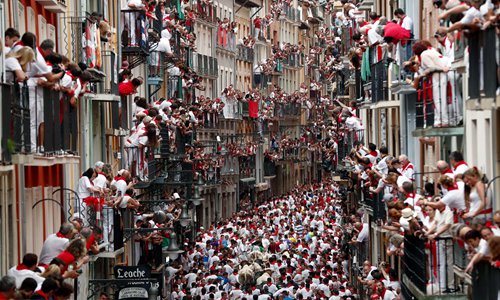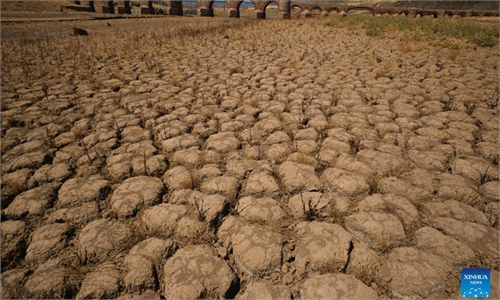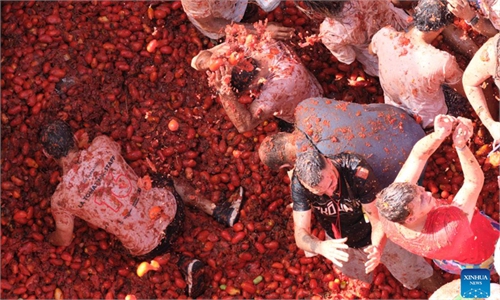Activists sign petitions as at least 10 dead from controversial tradition
Debate flares over Spain bull-running

Runners try to avoid bulls as they run down a street during the traditional San Fermin bull run in Pamplona, Spain, on Sunday. The festival, locally known as Sanfermines, is held annually from July 6 to July 14 in commemoration of the city's patron saint. Hundreds of thousands of visitors from all over the world attended the fiesta. Photo: IC
Spain's controversial bull-running festivals have once again hit the headlines after a deadly summer in which at least 10 people lost their lives, exacerbating divisions over the centuries-old tradition.
Seven deaths occurred in the eastern Valencia region where the practice of releasing bulls into the streets for entertainment has sparked debate, with the other fatalities taking place in the regions of Madrid, Castilla y Leon and Navarra in the north.
The 2022 toll raises to over 30, a total number of people who have been killed in Valencia's bull-running events since 2015.
This summer's victims, who died from injuries sustained while racing through the streets alongside a group of hefty bulls, known as "bous al carrer" in Valencian, were between the ages of 18 and 73.
Six of them were men and one was a woman, a French woman who was the oldest victim.
They died after being gored or trampled by the bulls. Countless other people were injured, among them minors.
Bull-running events are a highlight of summer festivities across Spain, with the best known being the San Fermin festival in the northern city of Pamplona.
The idea is that a small group of bulls are let loose into a fenced-off area of the streets and hundreds of foolhardy thrill-seekers run alongside them for a few adrenaline-fuelled minutes, in a spectacle that draws thousands of spectators.
In Valencia and in southern parts of neighboring Catalonia, such events are hugely popular and few are the villages that don't put on some sort of entertainment involving bulls barreling through the streets.
There are also "bous a la mar," races to the seafront where at the end of the run, the participants vie to try and make the bulls fall into the water, most ending up there themselves.
Experts are divided about when the practice of running the bulls began but Cuellar, a town some 150 kilometers north of Madrid, claims to have historical records dating back to the 13th century.
And although the exact origin of the tradition is unclear, it is thought to be emerged out of the need to bring bulls from the countryside into the towns on market day when they would be corralled through the streets with sticks.
Irrespective of how it began, it has become a political hot potato for local authorities, which often sparks heated debate and can win or lose an election.
German Zaragoza, head of the region's Federation of Bull-Fighting Clubs which promotes bull-running events as the Spain's "most-traditional and authentic" fiestas, says Valencia's love for the "bous al carrer" needs be take on by the politicians.
"And neither the city councils nor the regions have the authority to ban or organize a referendum" on the fate of such events.
But not all areas of Valencia feel the same, with towns like Sueca or Tavernes de la Valldigna refusing to issue permits for bull-running events in 2022.
And animal welfare associations have published a manifesto calling for a ban, which describes bull-running events as "torture dressed up as culture and tradition" in which "abuse is more than evident."
Such spectacles often involve "these noble animals" being beaten with sticks, kicked, jerked around, insulted, humiliated and subjected to stress, it states.
And the runners "are often drunk or under the influence of drugs, with many also injured."
So far, the petition has garnered some 5,500 signatures.
AFP


